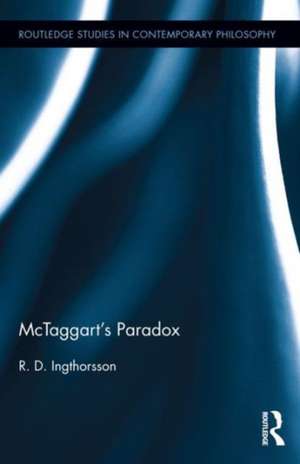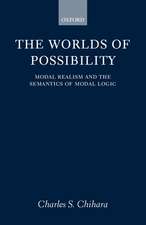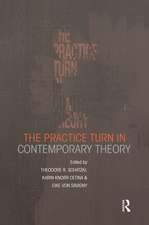McTaggart's Paradox: Routledge Studies in Contemporary Philosophy
Autor R.D. Ingthorssonen Limba Engleză Hardback – 5 iul 2016
| Toate formatele și edițiile | Preț | Express |
|---|---|---|
| Paperback (1) | 380.36 lei 6-8 săpt. | |
| Taylor & Francis – 5 mar 2019 | 380.36 lei 6-8 săpt. | |
| Hardback (1) | 1051.55 lei 6-8 săpt. | |
| Taylor & Francis – 5 iul 2016 | 1051.55 lei 6-8 săpt. |
Din seria Routledge Studies in Contemporary Philosophy
-
 Preț: 310.31 lei
Preț: 310.31 lei -
 Preț: 309.90 lei
Preț: 309.90 lei -
 Preț: 311.22 lei
Preț: 311.22 lei -
 Preț: 304.04 lei
Preț: 304.04 lei -
 Preț: 310.88 lei
Preț: 310.88 lei - 9%
 Preț: 903.32 lei
Preț: 903.32 lei - 8%
 Preț: 391.85 lei
Preț: 391.85 lei - 9%
 Preț: 1003.54 lei
Preț: 1003.54 lei -
 Preț: 312.90 lei
Preț: 312.90 lei -
 Preț: 313.34 lei
Preț: 313.34 lei -
 Preț: 310.16 lei
Preț: 310.16 lei -
 Preț: 307.69 lei
Preț: 307.69 lei - 9%
 Preț: 936.25 lei
Preț: 936.25 lei -
 Preț: 311.41 lei
Preț: 311.41 lei -
 Preț: 310.84 lei
Preț: 310.84 lei -
 Preț: 311.41 lei
Preț: 311.41 lei -
 Preț: 381.07 lei
Preț: 381.07 lei - 9%
 Preț: 934.94 lei
Preț: 934.94 lei - 9%
 Preț: 1038.15 lei
Preț: 1038.15 lei - 18%
 Preț: 1114.98 lei
Preț: 1114.98 lei - 18%
 Preț: 1112.21 lei
Preț: 1112.21 lei - 18%
 Preț: 1058.43 lei
Preț: 1058.43 lei - 18%
 Preț: 1055.51 lei
Preț: 1055.51 lei -
 Preț: 387.16 lei
Preț: 387.16 lei - 18%
 Preț: 1120.20 lei
Preț: 1120.20 lei - 18%
 Preț: 1057.13 lei
Preț: 1057.13 lei - 18%
 Preț: 1117.77 lei
Preț: 1117.77 lei - 18%
 Preț: 1058.69 lei
Preț: 1058.69 lei - 18%
 Preț: 1108.73 lei
Preț: 1108.73 lei - 18%
 Preț: 1111.55 lei
Preț: 1111.55 lei - 18%
 Preț: 1051.90 lei
Preț: 1051.90 lei - 18%
 Preț: 1109.78 lei
Preț: 1109.78 lei - 18%
 Preț: 1110.11 lei
Preț: 1110.11 lei - 18%
 Preț: 1052.35 lei
Preț: 1052.35 lei - 18%
 Preț: 1055.32 lei
Preț: 1055.32 lei -
 Preț: 481.58 lei
Preț: 481.58 lei - 18%
 Preț: 1111.87 lei
Preț: 1111.87 lei - 18%
 Preț: 1113.16 lei
Preț: 1113.16 lei - 18%
 Preț: 1115.69 lei
Preț: 1115.69 lei - 18%
 Preț: 1061.57 lei
Preț: 1061.57 lei - 18%
 Preț: 1053.95 lei
Preț: 1053.95 lei - 18%
 Preț: 1117.43 lei
Preț: 1117.43 lei - 18%
 Preț: 1059.84 lei
Preț: 1059.84 lei - 18%
 Preț: 1062.98 lei
Preț: 1062.98 lei - 18%
 Preț: 1064.70 lei
Preț: 1064.70 lei - 18%
 Preț: 1221.12 lei
Preț: 1221.12 lei - 18%
 Preț: 1108.24 lei
Preț: 1108.24 lei - 18%
 Preț: 1119.16 lei
Preț: 1119.16 lei - 18%
 Preț: 1060.25 lei
Preț: 1060.25 lei - 18%
 Preț: 897.16 lei
Preț: 897.16 lei
Preț: 1051.55 lei
Preț vechi: 1282.39 lei
-18% Nou
Puncte Express: 1577
Preț estimativ în valută:
201.22€ • 210.62$ • 167.47£
201.22€ • 210.62$ • 167.47£
Carte tipărită la comandă
Livrare economică 31 martie-14 aprilie
Preluare comenzi: 021 569.72.76
Specificații
ISBN-13: 9781138677241
ISBN-10: 1138677248
Pagini: 168
Dimensiuni: 152 x 229 x 14 mm
Greutate: 0.36 kg
Ediția:1
Editura: Taylor & Francis
Colecția Routledge
Seria Routledge Studies in Contemporary Philosophy
Locul publicării:Oxford, United Kingdom
ISBN-10: 1138677248
Pagini: 168
Dimensiuni: 152 x 229 x 14 mm
Greutate: 0.36 kg
Ediția:1
Editura: Taylor & Francis
Colecția Routledge
Seria Routledge Studies in Contemporary Philosophy
Locul publicării:Oxford, United Kingdom
Public țintă
Postgraduate and UndergraduateCuprins
Preface
1. Introduction
2. The Metaphysics
3. The Argument
4. The C Series
5. The Defences
6. The Objections
7. The B View and the Problem of Change
8. The A View and the Problem of Tense
9. The Conclusion
1. Introduction
2. The Metaphysics
3. The Argument
4. The C Series
5. The Defences
6. The Objections
7. The B View and the Problem of Change
8. The A View and the Problem of Tense
9. The Conclusion
Recenzii
"The book . . . is truly an excellent piece of both philosophy and scholarship: argumentative and rigorous, informative and thought provoking. It is also superbly written, exhibiting exceptional clarity, concision, and flow. It is in all respects a first rate contribution. Anybody interested in McTaggart, the philosophy of time, or metaphysics will reap tremendous rewards from engaging with Ingthorsson's ideas; do give them a go."—Notre Dame Philosophical Reviews
"Ingthorsson’s valuable book is a focused study of the paradox, which offers an insight into McTaggart’s overall metaphysical system and discusses a range of responses to the paradox . . . [This] is a valuable and well-researched addition to the literature on McTaggart’s infamous argument, and scholars interested in the paradox will benefit from careful study of it."—David Ingram in Review of Metaphysics
"For anyone who wants to get to grips with the major threads of thought that developed in response to McTaggart, this is an invaluable resource . . . The book is a rich source of argumentation and discussion of a number of core issues in the philosophy of time, and for that reason is well worth a read."—Kristie Miller in Phenomenological Reviews
"This book is, to date, clearly the most comprehensive and critical overview of the debate on McTaggart’s paradox."—Michelle Beer, Florida International University, USA
"Ingthorsson’s valuable book is a focused study of the paradox, which offers an insight into McTaggart’s overall metaphysical system and discusses a range of responses to the paradox . . . [This] is a valuable and well-researched addition to the literature on McTaggart’s infamous argument, and scholars interested in the paradox will benefit from careful study of it."—David Ingram in Review of Metaphysics
"For anyone who wants to get to grips with the major threads of thought that developed in response to McTaggart, this is an invaluable resource . . . The book is a rich source of argumentation and discussion of a number of core issues in the philosophy of time, and for that reason is well worth a read."—Kristie Miller in Phenomenological Reviews
"This book is, to date, clearly the most comprehensive and critical overview of the debate on McTaggart’s paradox."—Michelle Beer, Florida International University, USA
Descriere
This book presents the first critical overview of the last century of debate on what is popularly called "McTaggart’s Paradox". Scholars have long assumed that McTaggart’s argument stands alone and does not rely on any contentious ontological assumptions. The author demonstrates that this view is incorrect—McTaggart himself explicitly claimed his argument to be dependent on the context of his idealist metaphysics. The result is that scholars have proceeded to understand the argument on the basis of their own metaphysical assumptions.


















